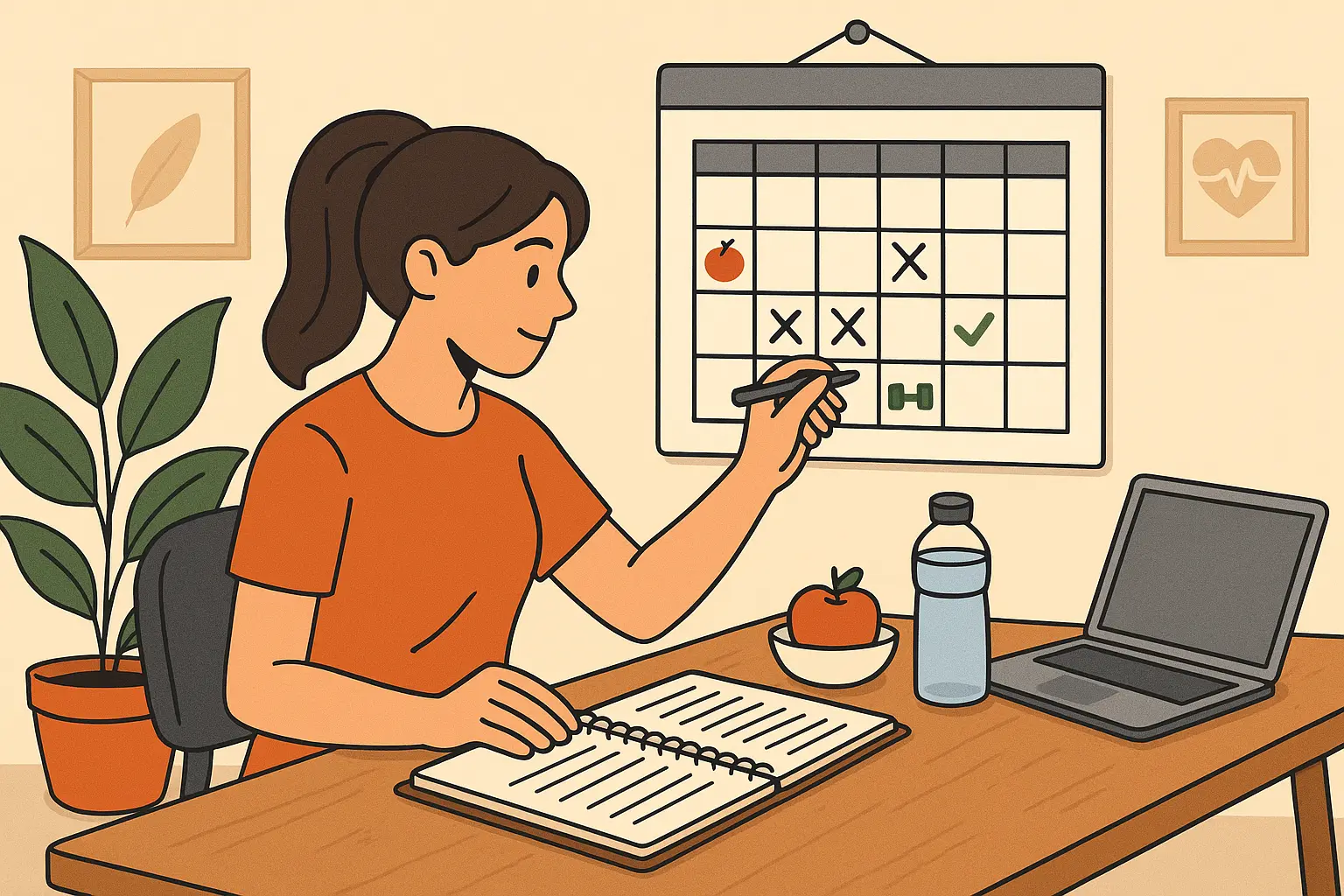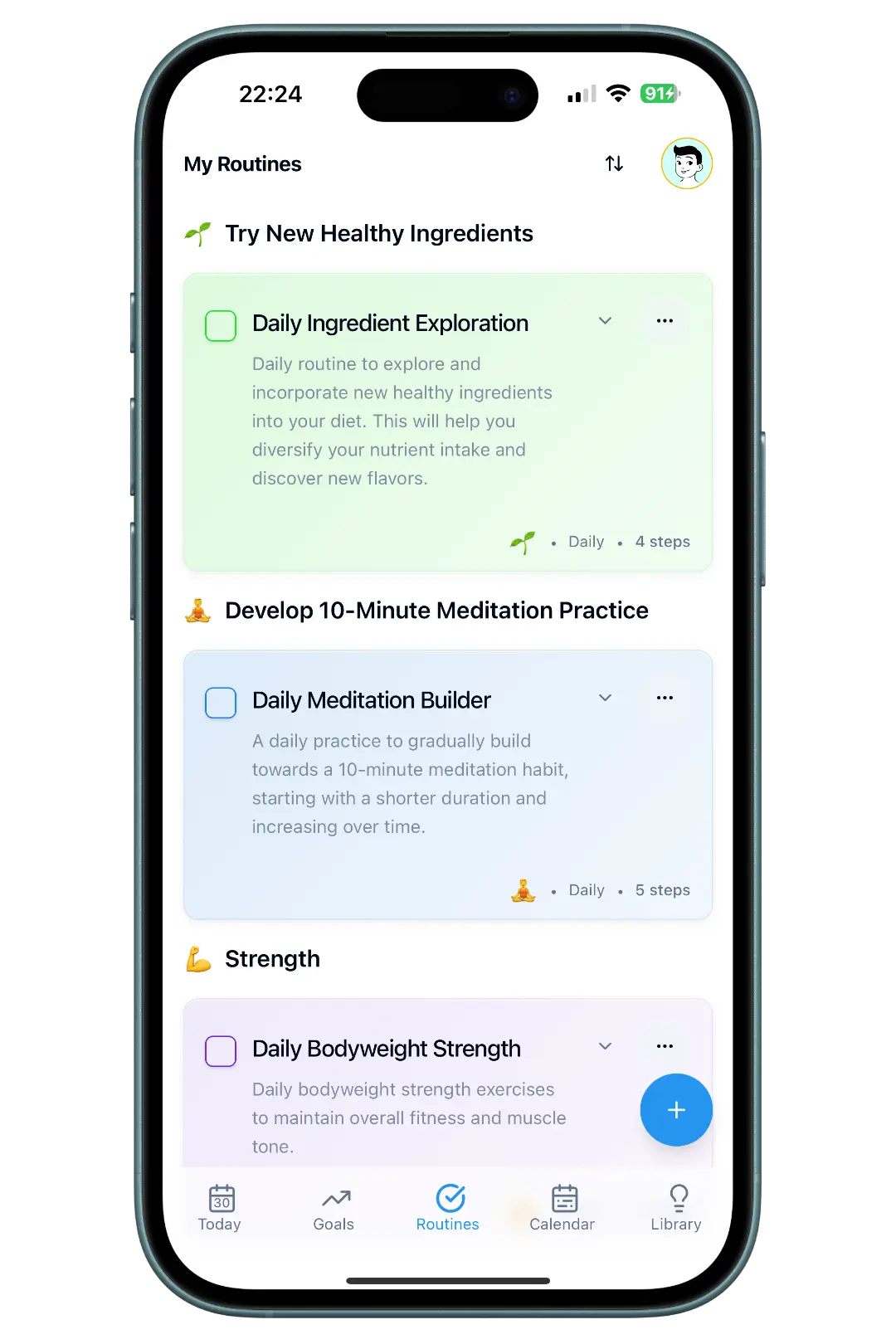
Building a Health Schedule That Actually Fits Your Busy Life
January 31, 2025
"I don't have time for a health routine." It's the most common reason people abandon their wellness goals. But what if the problem isn't lack of time—it's lack of a system that works with your real life? Here's how to create a health schedule that bends without breaking.
The Myth of Perfect Timing
We're told successful people wake up at 5 AM, meditate for an hour, and work out for 90 minutes. That might work for some, but for most of us, it's a recipe for failure. The secret isn't finding perfect time—it's optimizing the time you have.
The Flexible Framework Approach
Instead of rigid schedules, create flexible frameworks that adapt to your changing days:
Non-Negotiable Anchors (20% of your routine)
Choose 1-2 health habits that happen no matter what:
- 5 minutes of movement daily
- One healthy meal
- Minimum 7 hours of sleep
Flexible Options (60% of your routine)
Create multiple ways to meet your health goals:
- Exercise: gym session OR home workout OR long walk
- Nutrition: home-cooked meal OR healthy restaurant choice OR nutritious snack
- Stress relief: meditation OR journaling OR bath
Bonus Additions (20% of your routine)
Extra activities you add when time allows:
- Extended workouts
- Meal prep sessions
- Extra self-care activities
Time Audit: Finding Hidden Health Windows
Before creating your schedule, discover where time already exists:
The 5-Minute Scan
Look for 5-minute pockets throughout your day:
- Morning: While coffee brews (stretching, deep breathing)
- Commute: Walking meditation, health podcasts
- Work breaks: Desk exercises, hydration, healthy snacks
- Waiting time: Calf raises, breathing exercises
- Evening: Gentle stretches while watching TV
The 15-Minute Opportunities
Identify longer windows for more substantial activities:
- Lunch breaks: Quick workouts, meal prep, walks
- Early morning: Before the household wakes up
- Evening: After kids' bedtime, before your own
- Weekends: Batch cooking, longer exercise sessions
The Transition Times
Use the space between activities:
- Between meetings: 2-minute breathing exercises
- Before meals: Gratitude practice or mindful moments
- After work: Decompression walk or stretching
The Health Calendar Method
Weekly Planning (10 minutes every Sunday)
- Review your calendar for the upcoming week
- Identify challenging days with limited time
- Pre-select flexible options for busy days
- Schedule health blocks like any other appointment
- Plan your backup strategies for when things go wrong
Daily Micro-Planning (2 minutes each morning)
- Check your schedule and energy levels
- Choose your health priorities for the day
- Set up environmental cues for success
- Track your intentions in ProgressMade
Busy Day Health Templates
The Super Busy Day (5-10 minutes total)
- Morning: 2 minutes of deep breathing while coffee brews
- Workday: Take stairs, drink water, eat one healthy snack
- Evening: 5-minute stretch routine before bed
The Moderately Busy Day (15-20 minutes total)
- Morning: 5-minute movement routine (yoga, bodyweight exercises)
- Lunch: 10-minute walk or healthy meal preparation
- Evening: 5-minute wind-down routine
The Manageable Day (30-45 minutes total)
- Morning: 15-20 minute workout or substantial movement
- Midday: Healthy meal preparation or mindful eating
- Evening: 10-15 minutes of self-care (bath, reading, journaling)
Smart Health Scheduling Strategies
Batch Similar Activities
- Sunday: Meal prep for the week
- Monday/Wednesday/Friday: Movement sessions
- Tuesday/Thursday: Self-care activities
- Daily: Small maintenance habits
Use Your Natural Energy Patterns
- High energy times: Challenging workouts, meal prep
- Moderate energy: Walking, gentle yoga, cooking
- Low energy: Stretching, meditation, easy meal assembly
The 2-Option Rule
Always have two ways to meet each health goal:
- Exercise: Gym OR home workout
- Healthy eating: Cooking OR healthy takeout
- Stress management: Meditation OR journaling
Technology Integration for Busy Schedules
ProgressMade Optimization
- Quick logging: Use voice notes or one-tap tracking
- Flexible goals: Set minimum and ideal targets
- Pattern recognition: Review weekly data to optimize timing
- Motivation boost: Use streaks to stay consistent even on busy days
Calendar Integration
- Block health time like work meetings
- Set reminders 10 minutes before health activities
- Use travel time for habit stacking
- Schedule backup plans for cancelled activities
Automation Tools
- Meal delivery: For overwhelming weeks
- Workout apps: For equipment-free exercise anywhere
- Meditation apps: For guided stress relief
- Hydration reminders: To maintain basics automatically
Overcoming Common Scheduling Obstacles
"My Schedule Changes Too Much"
- Focus on habits that work anywhere (breathing, walking, water)
- Create location-specific routines (home, office, travel)
- Use flexible reminder systems
"Family Responsibilities Take All My Time"
- Include family in health activities (family walks, dancing)
- Use kid nap times or early mornings strategically
- Model healthy habits for children naturally
"Work Demands Are Unpredictable"
- Keep workout clothes and healthy snacks at the office
- Use lunch hours strategically
- Integrate health habits into work transitions
Building Your Personal Health Schedule
Step 1: Reality Check (10 minutes)
- Write down your actual weekly schedule
- Identify your most and least busy days
- Note your highest and lowest energy times
Step 2: Goal Setting (5 minutes)
- Choose 3 non-negotiable health priorities
- Set minimum daily requirements for each
- Define your ideal goals for good days
Step 3: Schedule Design (15 minutes)
- Map health activities to natural time slots
- Create templates for different types of days
- Plan backup options for each goal
Step 4: Testing and Adjusting (ongoing)
- Track what works in ProgressMade
- Adjust timing based on real experience
- Celebrate consistency over perfection
The 80/20 Health Schedule Rule
Focus 80% of your effort on the 20% of activities that provide the most benefit:
- Daily movement: Even 5 minutes counts
- Adequate sleep: Non-negotiable for everything else
- Regular meals: Prevents emergency food decisions
- Stress management: Improves decision-making for everything else
Remember: The best health schedule is the one you'll actually follow. Start with what feels manageable, track your progress in ProgressMade, and adjust based on real data from your life.
Your health deserves a place in your calendar—not just the leftover time.
